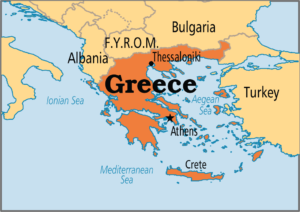TODAY’S READING FROM THE OLD TESTAMENT- 1 KINGS 1:1-53
 Today we begin the Book of Kings. Family intrigues follow David even to his dying days.
Today we begin the Book of Kings. Family intrigues follow David even to his dying days.
David is ‘advanced in years’ and perhaps is suffering from poor circulation. He cannot get warm even while piling on clothes.
His servants advise David to take a beautiful young virgin, Abishag, into his service. The Scripture seems to indicate that the young girl serves as his hot water bottle. Even though it is stated that they did not have sexual relations, the suggestion shocks our sense of moral propriety.
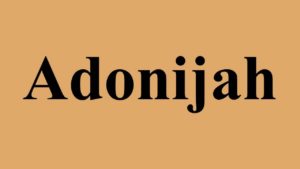 Adonijah is now the oldest surviving son and assumes it is time for him to take over the kingdom. (David’s oldest, Amnon, was killed by Absalom. The second-born, Kileab, or Daniel, must have died because there is no record of his life. The third son, Absalom, was killed by Joab, leaving Adonijah next in line.)
Adonijah is now the oldest surviving son and assumes it is time for him to take over the kingdom. (David’s oldest, Amnon, was killed by Absalom. The second-born, Kileab, or Daniel, must have died because there is no record of his life. The third son, Absalom, was killed by Joab, leaving Adonijah next in line.)
Adonijah exalts himself and gathers those whom he knows as supportive while he proclaims himself his father’s successor as King. Joab and Abiathar assist his coronation plans. However, Zadok, the priest, Benaiah, one of the celebrated mighty men, and Nathan, the prophet, were not supportive of Adonijah. They go to David to inquire what his real intentions are for a successor.
A sad commentary on David’s parenting is found in verse 6.
1 Kings 1:6 6 His father had never crossed him at any time by asking, “Why have you done so?” And he was also a very handsome man, and he was born after Absalom.
This suggests that David indulged his sons, neglecting his responsibility to discipline them when they were young. It appears that he only had a superficial knowledge of his family members.
Adonijah was very careful to keep those who were not supportive of his self-proclamation off the coronation guest list. Solomon, Nathan, Benaiah, or any of the other mighty men, were not invited.
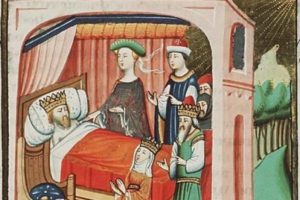 It was not uncommon for anyone who claimed the throne to kill all possible competitors. For this reason, Nathan decides to act quickly and protect Solomon and his mother from possible death by asking Bathsheba to remind David of his promise to put Solomon on the throne. Bathsheba also tells David what Adonijah has done to put himself forward as king.
It was not uncommon for anyone who claimed the throne to kill all possible competitors. For this reason, Nathan decides to act quickly and protect Solomon and his mother from possible death by asking Bathsheba to remind David of his promise to put Solomon on the throne. Bathsheba also tells David what Adonijah has done to put himself forward as king.
David confirms that Solomon is his choice for a successor and gives instructions that his coronation should take place immediately.
Zadok anoints Solomon as the rightful king.
Jonathan, the son of Abiathar, the priest, interrupts the coronation feast of Adonijah, the Usurper. Expecting good news, Adonijah welcomes him.
1 Kings 1:43 b Our lord King David has made Solomon king.
The phrase is similar to what we just heard the Apostle Peter proclaim concerning the Ascension of Christ.
Acts 2:36 36 “Therefore let all the house of Israel know for certain that God has made Him both Lord and Christ—this Jesus whom you crucified.”
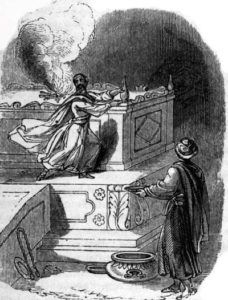 What is good news for Israel is bad news for the Usurper. Adonijah’s supporters flee and Adonijah, afraid for his life, lays claim to mercy by grabbing the horns of the altar.
What is good news for Israel is bad news for the Usurper. Adonijah’s supporters flee and Adonijah, afraid for his life, lays claim to mercy by grabbing the horns of the altar.
Solomon offers mercy on the condition that Adonijah remains faithful and submissive.
TODAY’S READING FROM THE NEW TESTAMENT – ACTS 4:1-37
What a great example we have in the apostles. They use every opportunity God gives them to preach Christ. Jesus is constantly the theme of their message. The healing of the lame man needed an explanation. There was no explanation but Jesus.
 Acts 4:12 12 “And there is salvation in no one else; for there is no other name under heaven that has been given among men by which we must be saved.”
Acts 4:12 12 “And there is salvation in no one else; for there is no other name under heaven that has been given among men by which we must be saved.”
Jesus forewarned his disciples that they would be empowered by the Spirit and persecuted by the world.
John 16:1-3 1 “These things I have spoken to you so that you may be kept from stumbling. 2 “They will make you outcasts from the synagogue, but an hour is coming for everyone who kills you to think that he is offering service to God. 3 “These things they will do because they have not known the Father or Me.
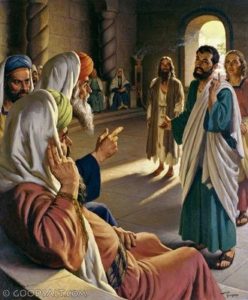 As Peter and John were speaking (The Scriptures point out that both were addressing the crowd), ten power groups oppose them.
As Peter and John were speaking (The Scriptures point out that both were addressing the crowd), ten power groups oppose them.
- The priests
- The captain of the temple guard
- The Sadducees (the theological liberals of their day, sympathizers with Rome)
- The rulers (v.5)
- Elders
- The scribes
- Annas, the former high priest
- Caiaphas, Annas’ son-in-law and the current high priest
- John (an opponent) v. 6
- Alexander and all who were of high priestly descent
We can learn from the response of the apostles. They were submissive (Acts 4:1-3), Spirit-filled (4:8), and they were shrewd (4:8-10). They turned their opposition into an opportunity to speak. They set the record straight. They were announcing that Jesus is the authority and the power to be reckoned with. By this Name, the lame man was healed, and by this Name alone, can mankind be saved (4:4:8-10; 12).
Their response was Scriptural (4:11) and sure (4:8,12). Where did their confidence come from? It came from the Holy Spirit (Acts 1:8), from the resurrection of Christ (v.10), from the healed man (v.10,13), from fulfilled Scripture (4:11), and the incomparable nature of Christ (4:12).
Our confidence in witness should be based on these solid realities.
Acts 4:13 13 Now as they observed the confidence of Peter and John and understood that they were uneducated and untrained men, they were amazed, and began to recognize them as having been with Jesus.
May that be said of us also.
These ten power groups are at a loss of what to do. The physical evidence of the healed man is indisputable. The events that they spoke about were known by everyone in Jerusalem (v.16). They were not done in a corner. They decide to give a gag order.
But Peter and John, with a submissive spirit, demonstrate that their allegiance was to a higher authority.
Acts 4:19-20 19 But Peter and John answered and said to them, “Whether it is right in the sight of God to give heed to you rather than to God, you be the judge; 20 for we cannot stop speaking about what we have seen and heard.”
 The apostles were not intimidated by this episode of interrogation. They immediately went to join the other believers who were gathering in prayer.
The apostles were not intimidated by this episode of interrogation. They immediately went to join the other believers who were gathering in prayer.
This corporate prayer meeting is very instructive.
- They recognized God’s sovereignty and supremacy in this situation and over all heaven and earth (v.24).
- They recognized Scripture’s full inspiration and authority (v.25) and its relevance to their situation, their faith, and practice.
- They realize that the issue is always Christ. He is the reference point. These ten powers are not mustering against them as much as against Christ (v.26).
- The perpetrators of Christ’s crucifixion and the perpetrators of the apostles’ persecution exercised their free will in their wicked deeds, and they would be held fully accountable and responsible for them (v. 27).
- Not one thought, motive, or action, of any individual or group, is unnoticed by God. Nothing escapes integration into His master plan.
Acts 4:27-28 27 “For truly in this city there were gathered together against Your holy servant Jesus, whom You anointed, both Herod and Pontius Pilate, along with the Gentiles and the peoples of Israel, 28 to do whatever Your hand and Your purpose predestined to occur.
- Rather than praying for less persecution and easier situations, they pray for a greater manifestation of God’s power and advance of His Kingdom purposes.
Verses 31- 37 describe the impact of the Holy Spirit’s power upon the community.
- All were filled again with the Spirit, even though they had been baptized with the Spirit at Pentecost. God’s presence and power was sensed again and again (4:31a).
- The manifestation of the Holy Spirit’s filling was that they spoke the Word of God with boldness (4:31b).
- There was a supernatural experience of oneness. They were one in heart and mind (4:32).
- They demonstrated compassionate materialism. (This was not communism. Their property still belonged to them, but they shared unselfishly.)
Acts 4:32b Not one of them claimed that anything belonging to him was his own, but all things were common property to them.
- They experienced grace and power and could testify of the impact of the resurrection on their lives (v.33).
- They were aware of needs in the community and met them, treating every believer as a family member.
- They were committed to supporting the ongoing work of discipleship and evangelism materially and financially. Barnabas, the Son of Encouragement, was an example of one who liquidated assets and brought the money to the apostles to ensure the continuing work of the church in fulfilling the Great Commission.
TODAY’S READING FROM THE BOOK OF PSALMS- PSALM 124:1-8
If the Lord had not been on our side … (you can fill in the blanks). The Psalmist admits that if the Lord had not been on their side, they would have been goners.
Therefore, he praises the Lord who has provided for their deliverance (salvation).
Psalm 124:8 8 Our help is in the name of the LORD, who made heaven and earth.
TODAY’S READING FROM THE BOOK OF PROVERBS- PROVERBS 16:24
Proverbs 16:24 24 Pleasant words are a honeycomb, sweet to the soul and healing to the bones.
Our words can bring healing or pain. Ask the Holy Spirit to bridle your tongue.
Ephesians 4:29 29 Let no unwholesome word proceed from your mouth, but only such a word as is good for edification according to the need of the moment, so that it will give grace to those who hear.
PRAY FOR THE NATIONS (from Operation World and Prayercast.com)
Greece
Europe
Geography
Area: 131,957 sq. km
Southernmost part of Balkan Peninsula in southeast Europe and 150 inhabited islands in the Ionian, Aegean and Mediterranean Seas. The islands constitute 20% of the land area.
Population: 11,183,393 Annual Growth: 0.22%
Capital: Athens
Urbanites: 61.4%
HDI Rank: 25 of 182 (UN Human Development Reports 2009)
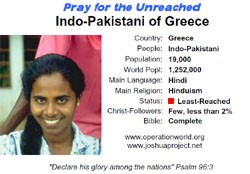 Peoples: 46 (22% unreached) All peoples
Peoples: 46 (22% unreached) All peoples
Unreached Peoples Prayer Card
Official language: Greek Languages: 24 All languages
Religion
Largest Religion: Christian
|
Religion |
|
Pop % |
Ann Gr |
|
10,228,331 |
91.46 |
0.0 |
|
|
41,376 |
0.4 |
1.6 |
- In Acts 16:9, Luke writes, “During the night Paul had a vision of a man of Macedonia standing and begging him, ‘Come over to Macedonia and help us.'” Paul responded, and the subsequent evangelization of Greece brought the Gospel into Europe. Greece was the seat of one of the greatest ancient civilizations. Sophisticated science, medicine, philosophy, drama, and the arts flourished, particularly in Athens. Ruins like the Parthenon are reminiscent of the achievements of that golden age. Strategically located near Asia and surrounded by the Aegean, Ionian, and Mediterranean Seas, Greece has had a significant sea trade history. Today, Greece has the world’s largest merchant fleet.
Democracy was first practiced in Greece’s early city-states, but in the years that followed much freedom was lost. Four hundred years of Turkish domination ended in 1830 with independence and the institution of a monarchy. World War II brought Nazi occupation, followed by civil war and two military dictatorships, which ended in 1974. A parliamentary republic was formed, and the monarchy was eliminated. In the late 2000s, a financial crisis swept the globe and devastated Greece. A history of massive public spending and tax evasion, combined with a debilitating recession, led to a severe government debt crisis and a decrease in the living standards of its people. Greece has yet to recover. On top of this, over one million people have fled war and persecution in Africa and Asia, landing on Greece’s shores in search of peace. In fact, hundreds still arrive daily. Many of these vulnerable masses find themselves stranded and unable to find asylum. Greece’s refugee population has now reached over 62,000; their living conditions are deplorable and unsustainable.
The Greek Orthodox Church is the official church of Greece and the strong force that perpetuated the Greek culture and language during the long Ottoman rule. It continues to be a significant part of the cultural identity of the nation and receives state funding. Most of the population (98%) considers themselves to be Orthodox, but less than three percent attend any church regularly. Although laws have changed, lessening discrimination for non-Orthodox believers, Protestants and Catholics often face problems if it is perceived they are drawing Greeks away from the Orthodox Church. But Evangelicals, both within and outside the Orthodox Church, are finding ways to reach the many who do not know the Gospel through service and other activities.
Literature has proven to be a useful tool in the past, but greater variety would be a blessing. Pray for the seed-sowing work of the Greek Bible Society and the Gideons in disseminating the Scriptures and SU in producing Bible reading aids. AMG founded the publishing house O Logos and operates five Christian bookstores around the nation; other publishing ministries include Pergamos and Anogeion.
PRAYER: You are the Sovereign Lord of heaven and earth. Your counsel will not be thwarted. You have made Jesus (whom men crucified, but You raised from the dead) to be Lord and Christ in the ascension. We have the same certainties as the apostles to bolster our boldness. Fill us with Your Spirit and make us faithful witnesses, fervent intercessors, and strategic ambassadors. Give us pleasant words, words of grace, that will draw people to Your Son. In Jesus’ Name. Amen.

